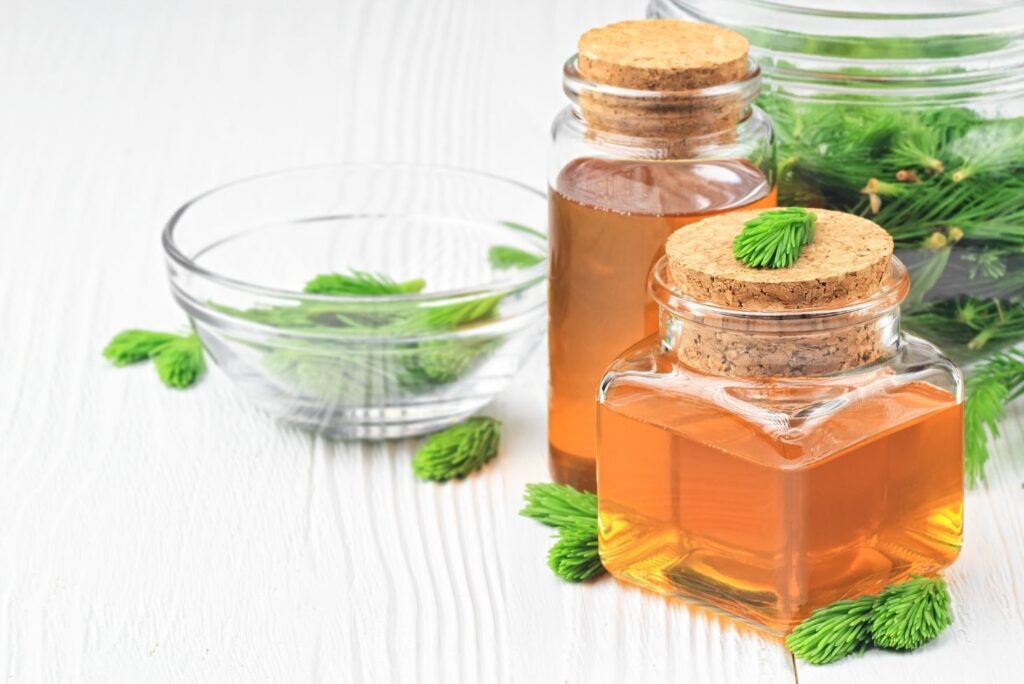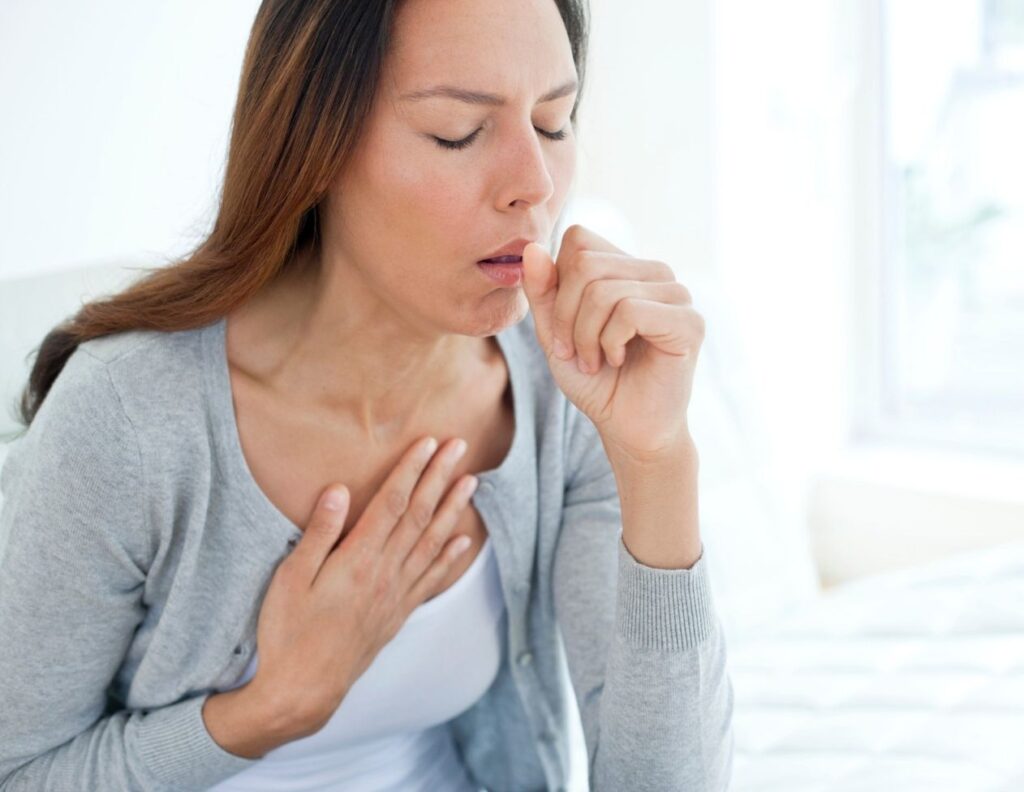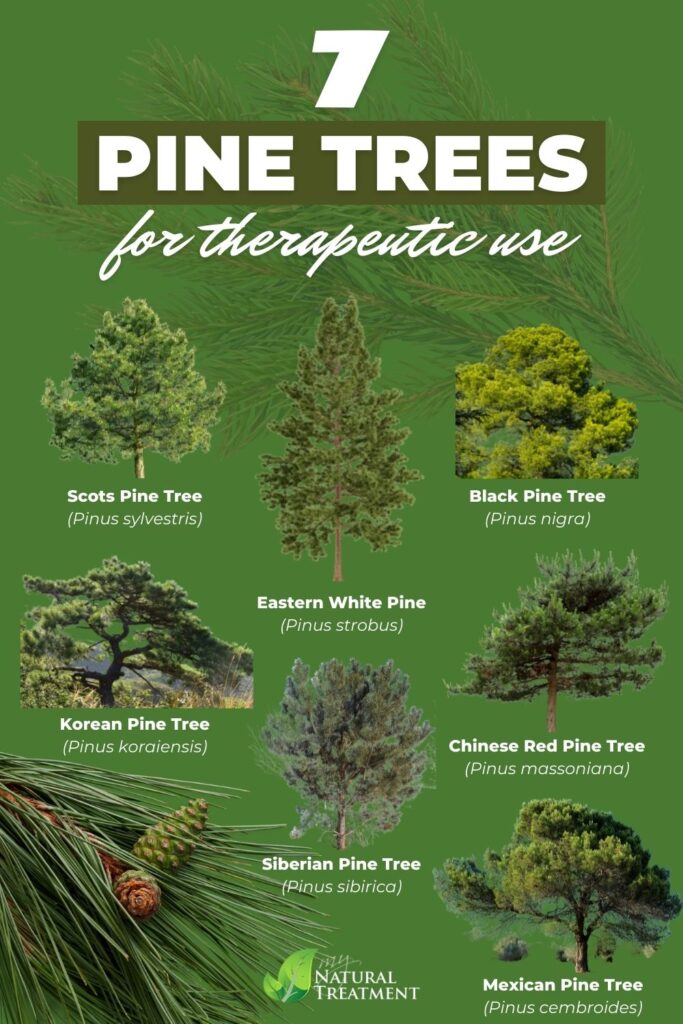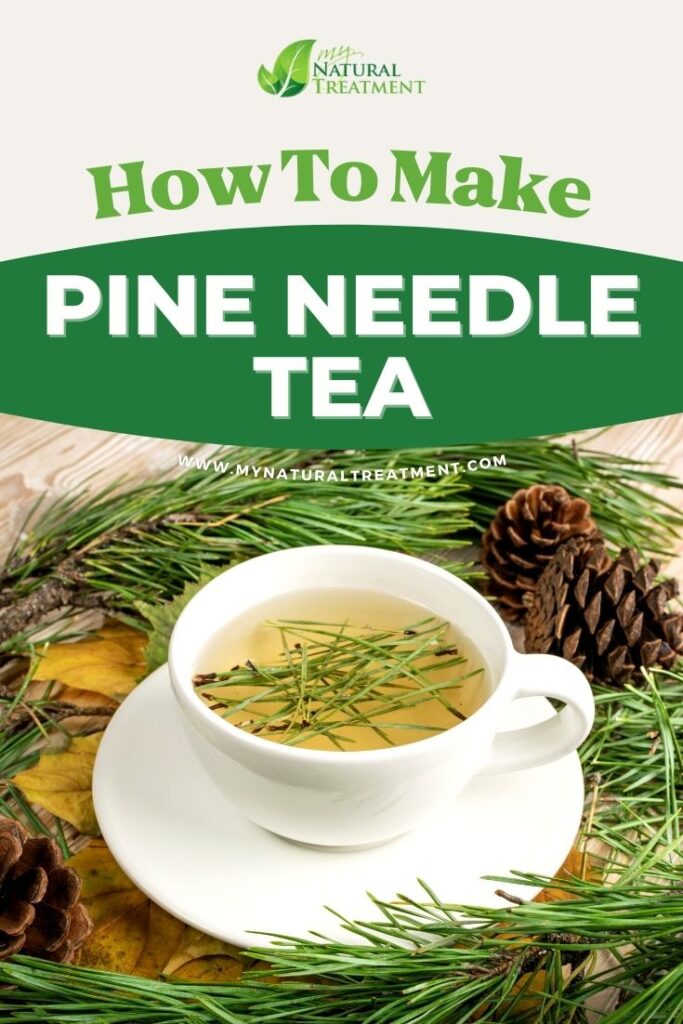If you want to learn about the health benefits of pine needles and how to use pine needles for different health conditions, continue reading this article and find out. But first.
Pine needles have been praised for centuries for their health benefits in most of Europe, North America, and pretty much everywhere they grow. In addition to the pine needles, there are other parts of the pine tree with known health benefits, namely the pine cones, the young branches, the resin, the bark, and the buds. Here we’re going to expand more on the health benefits of pine needles, and how to use pine needles for healing. But first, let’s see what pine trees are good for pine needle tea and how you can use pine needles as natural remedies.

In This Article You Will Find:
What Pine Trees Are Good for Pine Needle Tea?
There are over 80 known species of pine trees around the world, and most of them have therapeutic effects and can be used to make pine needle tea, syrup, balm, and other natural medicine. However, the most popular species of pine trees that are good for pine needle tea are:
- Red pine tree/Scots pine tree (Pinus sylvestris)
- Black pine tree/Australian pine tree (Pinus nigra)
- Eastern White Pine (Pinus strobus)
- Korean pine tree (Pinus koraiensis)
- Chinese red pine tree (Pinus massoniana)
- Siberian pine tree (Pinus sibirica)
- Mexican pine tree (Pinus cembroides)
Beware! Avoid using needles from any Cypress or Yew tree as they can be toxic!
Health Benefits of Pine Needles
Pine needles have a multitude of health benefits, and they are known for their antiseptic, antioxidant, and analgesic properties for the respiratory and nervous systems, blood circulation, and the heart. Here are the most important health benefits of pine needles, when used internally as tea, syrup, or tincture and topically as essential oils, balm, or in warm baths.
- cough
- cold and flu
- chronic bronchitis
- airways inflammation
- UTIs (cystitis, nephritis, urethritis)
- neuralgia pain
- rheumatic pain
- neurosis & heart neurosis
- microcirculation problems
- blood clots
- psoriasis
- skin conditions
The health benefits of pine needles are numerous, and here is how you can turn them into amazing homemade natural medicine.
5 Natural Medicines with Pine Needles to Make at Home
Unlike the other parts of the pine tree, pine needles can be harvested all year round and can be used both fresh and dried, depending on how you use them. The most effective ways to use pine needles for health problems are pine needle tea, pine needle syrup, pine needle balm, and pine needle baths.
- Pine Needle Tea
- Pine Needle Decoction
- Pine Needle Syrup
- Pine Needle Balm
- Pine Needle Baths
The pine needle tea, syrup, or tincture are great for treating cough, chronic bronchitis, airway inflammations, urinary tract infections, neuralgia, and rheumatic disease. Warm baths with pine needle decoction from fresh leaves help to fight neurosis, and heart neurosis, have a comforting effect, and can heal various skin problems. Pine needle essential oil is a great aid for the respiratory tract in inhalations, and when added to carrier oil is a natural remedy for skin conditions. Here is how to prepare these remedies at home.
How to Make Pine Needle Tea
To make the pine needle tea, put 2 tablespoons of dried/fresh pine needles, coarsely chopped, in a cup of boiling water. Steep for 30 minutes, then strain the tea. Sweetens to taste with honey.
How to Make Pine Needle Decoction
Simmer 2 tablespoons of coarsely chopped dried/fresh pine needles in 500 ml water (2 cups) for 15 minutes, in a stainless steel or enamel pot. Pour more water over the tea, to make for the evaporated water, so that in the end you have 2 cups of decoction. Strain the hot tea through cotton gauze. Sweetens to taste with honey. You can use pine cones instead of pine needles to make this recipe.
How to Make Pine Needle Syrup
Make the syrup a few hours after harvesting so that the aromatic oils in the pine needles do not have time to evaporate. Pick the pine needles from the freshly harvested pine branches. Crush the pine needles onto a wooden board as fine as possible using a rolling pin. In a wide-mouth glass jar with a lid, pour a 3/4 inch (1.2-2 cm) thick layer of raw honey, then add a thin and uniform layer of crushed pine needles and then a new layer of honey and so on until you fill up the jar. Finally, on top of the last layer of pine needles pour a 1.5-2 inch (4-6 cm) thick layer of honey, and seal the jar.
Leave to macerate in the pantry for 2-4 weeks, then strain, and the pine needle syrup is ready for use. You can also make this syrup in the spring, from pine buds instead of pine needles, but this one from the pine needles harvested in the month of January is the richest in volatile oils and has the strongest healing effects in respiratory illnesses and some hormonal conditions.

How to Make Pine Needle Balm
To make pine needle balm you need 2 tablespoons of pine needles roughly chopped, 1 tablespoon of lavender flowers, 100 g of ghee (clarified butter), and dwarf pine, lavender, marjoram, and rosemary essential oils (10 drops each). If you don’t have ghee or want to make a vegan balm, use olive oil and vegan wax instead (100 ml of oil and 10 g of wax).
Preparation:
- Carefully melt the clarified butter on a double boiler, add the pine needles and lavender flowers, cover the bowl, and set aside for 30 minutes. Strain the content through a sieve or gauze to remove the plants.
- After it has cooled down a bit, add the essential oils, stirring carefully. Pour the pine needles balm into glass jars, wait for it to harden, and then close the lids tightly.
The pine needle balm is used for muscle pain, neuralgia, rheumatic pains, and sciatica.
Pine Needle Baths
Add 2-3 handfuls of finely chopped young pine branches with the needles, in 5 l of cold water, and leave to soak overnight. Strain and leave the cold macerate aside. Boil the used pine branches and needles in another 3-4 liters of water. After boiling, leave the decoction to cool and strain. Finally, mix the cold macerate and the decoction together and pour them into the warm bathwater.
If the water turns colder, heat it up gradually by pouring more hot water into the bathtub so that your skin absorbs as many active substances as possible. Bathe for 15-20 minutes. Pine needle baths are a wonderful remedy for muscle fever, joint pain, rheumatic pains, asthenia, exhaustion, chronic fatigue, and convalescence.
12 Home Remedies with Pine Needles
1. Dry Cough
For a dry cough, drink 2-3 cups of pine needle tea a day or two cups of pine needle decoction, prepared after the instructions abovementioned.

2. Cold and Flu
Just like in the case of cough, drink 2-3 cups of pine needle tea a day or two cups of pine needle decoction. You can also add 30 drops of pine needles tincture, in two teas per day.
3. Bronchitis, Asthma, Pneumonia
Take 3-4 tablespoons of pine needle syrup daily, which you can prepare after the recipe mentioned above. Swallow slowly, letting it slide down the throat. To make the remedy more effective, take a pine needle bath.
4. Rhinitis and Sinusitis
Make inhalations with pine needles, as follows. Make a pine needle broth in a pot of water. When it starts steaming, remove the pot from the fire lean over, cover your head with a towel, and inhale the steam. Continue until you feel that your sinuses have decongested and the tea has turned cold.

5. Low Immunity
When you are down with a cold frequently and have recurrent cystitis, this is a sign of a weakened immune system. To boost immunity, have 2 teaspoons of pine needle syrup, three times a day.
6. Vitamin C Deficiency
One of the least known health benefits of pine needles is vitamin C deficiency and scurvy. Finely crush 100 g of pine needles in a mortar together with 1 or 2 tbsp of cold water, to make a paste. Put it into a pot, pour 3 l of boiling water over it, 2 tbsp of lemon juice, and mix well. Bring to a boil, on low heat, and simmer for 20-30 minutes, then cover the pot and let the decoction infuse for three hours. Strain and drink half a cup of this decoction throughout the day. The duration of this treatment is two weeks. Pause for ten days and resume if needed.
7. Rheumatic Pain
For rheumatic pain, take a pine needle bath (recipe above), or make the following pine needle decoction. Add 2 handfuls of pine needles in 3 l of cold water into a pot and bring to a boil. Simmer on low heat for 10 minutes, then remove from the fire, cover with a lid, and leave for 4 hours. Strain and keep the decoction in the fridge. Drink the entire quantity during the day instead of water, for ten days straight. The rheumatic pain will gradually go away. To make the remedy more efficient, take pine needle baths at least once a week.
8. UTIs
The effectiveness of UTI therapy is greatly influenced by a high fluid intake, so pine needle tea or decoction is preferable. For pyelitis, catarrhal cystitis, and kidney sand, drink 2-3 cups of pine needle tea a day or 2 cups of pine needle decoction.

9. Intestinal Parasites
Amongst the less-known health benefits of pine needles is their deworming effects. To kill intestinal parasites, drink 1 cup of pine needle decoction in the evening, before bed. After three nights of treatment, supplement with food-grade magnesium sulfate (Epsom salt) for its purging effects. Follow the recommended doses on the package or consult with a physician.
10. Oral Inflammations
Pine needle decoction is also amazing for stomatitis, gingivitis, oral mycosis, canker sores, and erosions of the oral mucosa. To make it more effective, rinse your mouth after every meal and in the evening before bedtime, with a pine needles decoction in which you add a teaspoon of baking soda.
11. Varicose Veins
Pour 300 ml of boiling water over 500 grams of finely crushed pine needles. Cover and allow to infuse for two hours. Strain the tea using a multilayered gauze and spread obtained paste on the affected areas. Wrap in a sterile dressing and leave on for an hour. The treatment is done daily for two weeks.
12. Impotence
Pine needle syrup has a strong beneficial action on the good functioning of the gonads, fighting male infertility and impotence. This cure also helps with the dysfunction of the adrenal glands that cause eczema and skin diseases, autoimmune diseases (Addison disease), and dryness of the mucous membranes. To alleviate these problems, have 4-8 tbsp of pine needle syrup per day, on an empty stomach. The results usually show in time, usually after 2 months of treatment.
The Pine Is a High Vibrational Tree
Needless to say, the health benefits of pine needles and pine needles tea especially are very numerous. The reason is that the pine tree is a powerful energy generator. The best sanatoriums in France, Switzerland, and England are located in the vicinity of vast pine forests. It has been found that patients who walk daily among pine trees become more optimistic, have a much higher physical tone, and their healing speed increases significantly.
Bioenergeticians have rated the pine tree as the highest vital energy plant of all the plants in the European flora. Perhaps this explains the multitude of health benefits of pine needles, buds, and resin. Dried pine needles can also be used for smudging, which is a natural way to disinfect and deodorize enclosed spaces such as attics, basements, or outbuildings, as well as cleanse the home from negative energies.
More Recipes with Pine
Pine Needle Syrup
Pine Resin Salve
Pine Needle Salve
Pine Pollen
Pine Buds
We hope that you’ve learned something useful by the end of this article, and if this information has helped you, please share it so more people can use it. Stay healthy, naturally!




4 comments
How can I share it, as you suggest, when I can’t copy and paste it? – Why it copy/paste disabled?
Hello Bob! At the bottom of the article there are three social media button so you can share the article on Twitter, Facebook and Pinterest. If you want to share by e-mail, you can always copy the link and send it, and if you want to “download” the article, you can print it. Unfortunately we had to disable the copy/paste because we had situations when people copied our content entirely and put it on their website and this negatively impacted our website. We put a lot of work and effort in what we do, and we’re constantly copied, consored and attacked. I hope that you appreciate the information here and find it useful for you. Much health. 💚🌿😌
Thank you for giving us this information.
You are welcome. Much appreciated!